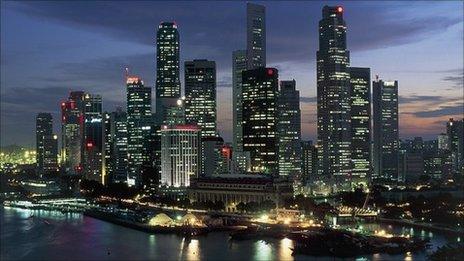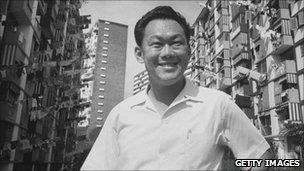Can Singapore become a start-up hub?
- Published

Singapore's skyline glitters with the regional headquarters of big multinationals - but can it create the right environment for new businesses to thrive?
It is 10 years since I went to see Lee Kuan Yew, the founder of Singapore.
He had stood down as prime minister of the neat and tidy city state a decade earlier, but he retained enormous behind-the-scenes influence in a job called Senior Minister. He is now called Minister Mentor and Singapore's prime minister is another Mr Lee, his son Lee Hsien Loong.
I was there because something Mr Lee Senior Minister had said about failure had caught my attention, and that is what we talked about.
Some history first: for 30 years under his guidance, the country had engineered a deliberate, government-inspired attempt to attempt to make Singapore a first world oasis in a third world region.
Israel provided the model, surrounded as it was by hostile Arab states, just as Singapore felt itself surrounded by hostility when the Malaysian Confederation fell apart in 1965.
"Like Israel, we had to leapfrog the rest of the region, and attract multinational companies," he told me.

Lee Kuan Yew was Singapore's prime minister from 1959 to 1990
For 30 years, Singapore played catch up, but by 2000 there was nowhere to take a lead from. So the Senior Minister issued a new call to the island nation of five million people.
"It's time for a new burst of creativity in business," he told me. "We need many new tries, many start-ups. Out of 10 maybe one will succeed, and eight will fail."
This was deliberately radical talk from a leader whose government had directed his country so closely for so long. The old ways would not work anymore, he said.
Singaporeans would have to stick their necks out and start to embrace risk as a way of life, without a government safety net.
Gleaming buildings
So it was that in 2002, a government commission recommended a push for entrepreneurism in Singapore Then they designated a minister with special responsibility for it.
I suppose it is what many places do, but it does seem typical of the way this city state thinks.
So recently I went back, to collect some Singapore start-up stories for radio, television and the BBC website, from some Singapore entrepreneurs.
I found the place putting even more faith in real estate than a decade previously. Like Dubai, Singapore still seems to think that if we build it, they will come.
Inside many of the new buildings there are acres of retailing. Shopping is still one of the main leisure activities of the city state, a national form of self expression.
To encourage business to develop around the new technology that I found Lee Kuan Yew very keen on 10 years ago, there are government-inspired clusters of activity. Again, this drive is expressed in soaring brand new buildings.
There are many striking examples. In glittering buildings, the Biopolis centre groups research institutions alongside many international medical companies. They have been attracted to Singapore as an Asian base in the same way that banks were in the 1980s. Nearby is Fusionpolis, designed to do the same thing for physical sciences and communications.
Impressive buildings, with impressive researchers inside them. But is this really creating a city of risk takers prepared to set up on their own - true individual entrepreneurs?
Staying ahead
Next to these Knowledge Hubs is the Asian campus of the famous European Business School INSEAD. It is celebrating its 10th anniversary, so I asked Professor Patrick Turner from the entrepreneurship department there how he thought Singapore's quest for entrepreneurs was shaping up.
He said that after the push started, company formation doubled year by year from 2003 to 2007. Then the global financial crisis hit and things cooled down.
Professor Turner told me that there were other challenges too: "One of the problems has been trying to do a Silicon Valley USA thing with a Singapore kind of mentality, which is not the same.
"In other countries this sort of change would take a generation. But they're agile in Singapore so it make take half the time, meaning that we're only half way through the process."
One striking story comes from Lyn Lee, proprietor of the highly specialist chain of shops called Awfully Chocolate. It has eight outlets in Singapore and more in Hong Kong, Taiwan, Jakarta and mainland China.
She's built a little empire out of her impressive cakes, but she is frustrated by the way clever Singaporeans look down their noses at service jobs.
The prime ambition of a bright local remains a job in the very well paid civil service, says Lyn Lee. Or a big multinational company. Another entrepreneur told me that he thinks the availability of official funds for start-ups encourages an industry of grant-getting, not risk-taking.
Singapore is one of those start-from-almost-nowhere countries that has gone up like a rocket, propelled by a then visionary belief that international banks and corporations needed an offshore beachhead in Asia.
Now the multinationals want to be onshore and up to their necks in China. Singapore has to find way of staying ahead of expectations. Its prosperous people will have to heed the Senior Minister's message of ten years ago, and start taking risks.
Listen to Peter Day's report on entrepreneurship in Singapore in an edition of Global Business on the BBC World Service.